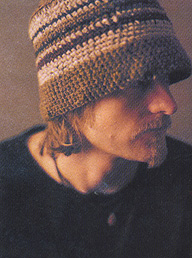
HOUSE OF RAINE
Source: Smug Magazine, February/March 2000 In a world that seems increasingly polarized between heatrless cynics and the blindly faithful, Our Lady Peace frontman Raine Maida is a heathly skeptic. Whether addressing millenium-mania, the music his band makes, or the impersonal impact of cyber-technology, Maida remains resolutely thoughtful."To sit in front of your computer for three hours surfing the web is really no different than watching TV, for the most part," he surmises. "I know there are great websites where you can find valuable information, but most of the kids I've talked to are like, 'Wow, you can play golf with somebody in Saudi Arabia/' Or 'You can play Tiger Woods '99.' Who gives a shit? How is that better?
"That's why for me a live show these days is starting to have much more weight than it did even when we first started out," he continues. "I really respect the fact that all these people are in a room and there's something tangible going on that everybody can connect with. It's this intense situation where we're all equal and they're just as much a part of the music as we are."
Thanks to the heavy emphasis Our Lady Peace has always placed on touring, the Toronto quartet has built itself a solid following (more so north of the border than in the States) with music that strikes a meticulous balance between rock and pop, head and heart.
In recent years the band has tamed some of the raw edges that cut through its 1995 debut album, Naveed (Relativity), and taken on a stronger, more polished songwriting focus that echoes Live and R.E.M. Inspired by artists like Sinead O'Connor, Faith No More's Mike Patton, and Prince, Maida unabashedly packs his lyrics with some of the weightiest topics around-death is one of the pervasive themes on the group's latest effort, Happiness Is Not A Fish That You Can Catch (Columbia). But he's always careful to leave enough room for listeners and his own bandmates to work out the meaning of the songs for themselves.
"I think sometimes the more ambiguous the lyric the better, because then it kind of washes with the music and it becomes this one piece," he says. "It's really weird because of ninety percent of the songs [the band] doesn't really know what I'm talking about, and no one's ever asked. I think they like the lyrics and, as most of our fans do, they interpret them in different ways. That's the beauty of music. That's why I got into music and started writing songs, and especially lyrics. With all the people I admired growing up you didn't feel like you were being hit over the head with 'This is what it's about.' You could take something personal from it."
Story by Sandy Masuo, Photography by Dennis Kleiman




back to menu